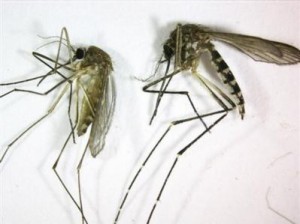West Nile Virus Update
The occurrence of West Nile Virus (WNV) in Canada was much reduced last year with only 8 cases in all of Canada and only one suspected case in Ajax, Ontario. Dead bird surveillance in Ontario turned up on 6 positive birds for the virus. (See the Durham Region Health Department’s Environmental Health Plans for 2010 at right)
Therefore, Durham Region Health is suspending their dead bird surveillance but will continue to monitor for adult and larval mosquitoes in urban areas and stormwater ponds. They will also continue to monitor reports of human and equine West Nile Virus infection and continue their public education programs and more.
 There are many types of mosquitoes found in Scugog. Because we live in a wetland, there will be nuisance mosquitoes but many of those types of mosquitoes are not “vectors” or transmitters of WNV. The dominant vector mosquito is a type called Culex Pipiens. This is a mosquito that does not breed in wetlands. It is called a “house mosquito” for a reason as it prefers urban areas with sources of stagnant water such as storm water drainage systems, stopped up eaves troughs and small areas of standing water such as up-turned wheel barrows, old tires, pails and saucers around outdoor plants. They like these conditions because there is no competition for their eggs and larvae.
There are many types of mosquitoes found in Scugog. Because we live in a wetland, there will be nuisance mosquitoes but many of those types of mosquitoes are not “vectors” or transmitters of WNV. The dominant vector mosquito is a type called Culex Pipiens. This is a mosquito that does not breed in wetlands. It is called a “house mosquito” for a reason as it prefers urban areas with sources of stagnant water such as storm water drainage systems, stopped up eaves troughs and small areas of standing water such as up-turned wheel barrows, old tires, pails and saucers around outdoor plants. They like these conditions because there is no competition for their eggs and larvae.
Wetlands support a wide number of other types of mosquitoes many of which do not even bite humans but which are an important food source for fish, birds, dragonflies, frogs, toads and more.
